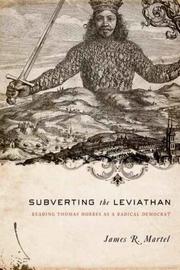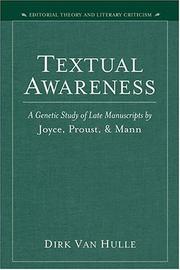| Listing 1 - 10 of 19 | << page >> |
Sort by
|

ISBN: 9780231139847 9780231511483 Year: 2007 Publisher: New York, NY
Abstract | Keywords | Export | Availability | Bookmark
 Loading...
Loading...Choose an application
- Reference Manager
- EndNote
- RefWorks (Direct export to RefWorks)
Political science --- Science politique --- Philosophy. --- Philosophie --- Hobbes, Thomas, --- Political philosophy --- Philosophy

ISBN: 0472117726 9786613244581 1283244586 0472028197 9780472028191 9780472117727 9780472024957 0472024957 9780472113415 0472113410 9781283244589 6613244589 0472035223 1282445405 9781282445406 9786612445408 6612445408 Year: 2011 Publisher: Ann Arbor
Abstract | Keywords | Export | Availability | Bookmark
 Loading...
Loading...Choose an application
- Reference Manager
- EndNote
- RefWorks (Direct export to RefWorks)
Engaging political and literary luminaries in an alternative narrative about power.
Politics and literature. --- Conspiracies. --- Liberalism. --- Capitalism. --- Market economy --- Economics --- Profit --- Capital --- Liberal egalitarianism --- Liberty --- Political science --- Social sciences --- History --- Political crimes and offenses --- Literature --- Literature and politics --- Political aspects --- Benjamin, Walter, --- Benjamin, W. --- Political and social views. --- Benjamin, Walter --- Holz, Detlef, --- Banyaming, --- Benʼyamin, Varutā, --- Peñcamin̲, Vālṭṭar, --- Binyamin, Ṿalṭer, --- בנימין, ולטר --- בנימין, ולטר, --- ולטר, בנימין, --- Penyamin, Palt'ŏ, --- 벤야민 발터,
Book
ISBN: 1943208115 1943208107 9781943208111 Year: 2018 Publisher: Amherst, Massachusetts : Amherst College Press,
Abstract | Keywords | Export | Availability | Bookmark
 Loading...
Loading...Choose an application
- Reference Manager
- EndNote
- RefWorks (Direct export to RefWorks)
The human body is the locus of meaning, personhood, and our sense of the possibility of sanctity. The desecration of the human corpse is a matter of universal revulsion, taboo in virtually all human cultures. Not least for this reason, the unburied corpse quickly becomes a focal point of political salience, on the one hand seeming to express the contempt of state power toward the basic claims of human dignity--while on the other hand simultaneously bringing into question the very legitimacy of that power. In Unburied Bodies: Subversive Corpses and the Authority of the Dead, James Martel surveys the power of the body left unburied to motivate resistance, to bring forth a radically new form of agency, and to undercut the authority claims made by state power. Ranging across time and space from the battlefields of ancient Thebes to the streets of Ferguson, Missouri, and taking in perspectives from such writers as Sophocles, Machiavelli, Walter Benjamin, Hannah Arendt, James Baldwin, Judith Butler, Thomas Lacqueur, and Bonnie Honig, Martel asks why the presence of the abandoned corpse can be seen by both authorities and protesters as a source of power, and how those who have been abandoned or marginalized by structures of authority can find in a lifeless body fellow accomplices in their aspirations for dignity and humanity.
Society & culture: general --- Dead --- Death --- Social aspects. --- Political aspects. --- Dying --- End of life --- Life --- Terminal care --- Terminally ill --- Thanatology --- Cadavers --- Corpses --- Deceased --- Human remains --- Remains, Human --- Burial --- Corpse removals --- Cremation --- Cryomation --- Death notices --- Embalming --- Funeral rites and ceremonies --- Obituaries --- Philosophy
Book
ISBN: 9780415673457 9780203803264 Year: 2012 Publisher: Routledge
Abstract | Keywords | Export | Availability | Bookmark
 Loading...
Loading...Choose an application
- Reference Manager
- EndNote
- RefWorks (Direct export to RefWorks)
Book
ISBN: 0472072307 0472120506 9780472120505 9780472072309 9780472052301 0472052306 Year: 2014 Publisher: Ann Arbor [Michigan]
Abstract | Keywords | Export | Availability | Bookmark
 Loading...
Loading...Choose an application
- Reference Manager
- EndNote
- RefWorks (Direct export to RefWorks)
A radical critique of contemporary legal practices and understandings based on a new consideration of Walter Benjamin's "Critique of Violence"
Law --- Philosophy. --- Benjamin, Walter, --- Criticism and interpretation. --- Ten commandments --- Images. --- Benjamin, Walter, 1892-1940
Multi
ISBN: 9780823283774 9780823283750 Year: 2019 Publisher: New York, N.Y. Fordham University Press
Abstract | Keywords | Export | Availability | Bookmark
 Loading...
Loading...Choose an application
- Reference Manager
- EndNote
- RefWorks (Direct export to RefWorks)

ISBN: 0231139845 0231511485 Year: 2007 Publisher: New York Columbia University Press
Abstract | Keywords | Export | Availability | Bookmark
 Loading...
Loading...Choose an application
- Reference Manager
- EndNote
- RefWorks (Direct export to RefWorks)
Book
ISBN: 0822362848 0822362961 0822373432 Year: 2017 Publisher: Duke University Press
Abstract | Keywords | Export | Availability | Bookmark
 Loading...
Loading...Choose an application
- Reference Manager
- EndNote
- RefWorks (Direct export to RefWorks)
Book
ISBN: 0367439786 1003388086 1000873501 1003388086 Year: 2023 Publisher: Milton Taylor & Francis Group
Abstract | Keywords | Export | Availability | Bookmark
 Loading...
Loading...Choose an application
- Reference Manager
- EndNote
- RefWorks (Direct export to RefWorks)
Book
ISBN: 9780367439781 9781032482491 Year: 2023 Publisher: Abingdon, Oxon ; New York, NY : Routledge,
Abstract | Keywords | Export | Availability | Bookmark
 Loading...
Loading...Choose an application
- Reference Manager
- EndNote
- RefWorks (Direct export to RefWorks)
"The Routledge Handbook of Law and the Anthropocene provides a critical survey into the function of law and governance during a time period when humans have power to impact the Earth system. The Anthropocene is a 'crisis of the earth system'. This book addresses its implications for law and legal thinking in the 21st century. Unpacking the challenges of the Anthropocene for advocates of ecological law and politics, this handbook pursues a range of approaches to the scientific fact of anthropocentrism, with contributions from lawyers, philosophers, geographers and environmental and political scientists. Rather than adopting a hubristic normativity, the contributors engage methods, concepts and legal instruments in a way that underscores the importance of humility and an expansive ethical worldview. Contributors to this volume are the leading scholars and future leaders in the field. Rather than upholding orthodoxy, the handbook also problematizes received wisdom and is grounded in the conviction that the ideas we have inherited from the Holocene must all be open to question. Engaging such issues as the Capitalocene, Gaia theory, the rights of nature, posthumanism, the commons, geoengineering and civil disobedience, this handbook will be of enormous interest to academics, students and others with interests in ecological law and the current environmental crisis"--
Environmental law, International --- Sociological jurisprudence --- Geology, Stratigraphic --- Environnement --- Sociologie juridique --- Anthropocène --- Social aspects. --- Environmental aspects. --- Anthropocene --- Droit international --- Aspect social. --- Aspect environnemental. --- Anthropocène
| Listing 1 - 10 of 19 | << page >> |
Sort by
|

 Search
Search Feedback
Feedback About UniCat
About UniCat  Help
Help News
News